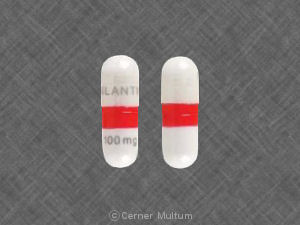What is the most important information I should know about phenytoin?
You should not use phenytoin if you also take delavirdine (Rescriptor).
What is phenytoin?
Phenytoin is an anti-epileptic drug, also called an anticonvulsant. It works by slowing down impulses in the brain that cause seizures.
Phenytoin is used to control seizures. Phenytoin does not treat all types of seizures, and your doctor will determine if it is the right medicine for you.
Phenytoin may also be used for purposes not listed in this medication guide.
What should I discuss with my healthcare provider before taking phenytoin?
You should not use this medicine if you are allergic to phenytoin or similar medicines such as ethotoin, fosphenytoin, or mephenytoin, or if you have:
- a history of liver problems caused by phenytoin;
- a heart condition called 2nd or 3rd degree "AV block";
- a history of slow heartbeats that have caused you to faint; or
- a condition for which you also take delavirdine (Rescriptor).
To make sure phenytoin is safe for you, tell your doctor if you have ever had:
- liver disease;
- an abnormal heart rhythm found on an EKG (electrocardiograph);
- diabetes;
- depression;
- suicidal thoughts or actions;
- a vitamin D deficiency or any other condition that causes thinning of the bones;
- porphyria (a genetic enzyme disorder that causes symptoms affecting the skin or nervous system); or
- if you drink large amounts of alcohol.
You may have thoughts about suicide while taking this medicine. Your doctor will need to check your progress at regular visits while you are using phenytoin. Your family or other caregivers should also be alert to changes in your mood or symptoms.
Patients of Asian ancestry may have a higher risk of developing a rare but serious skin reaction to phenytoin. Your doctor may recommend a blood test before you start the medication to determine your risk of this skin reaction.
Seizure control is very important during pregnancy. Do not start or stop taking this medicine without your doctor's advice if you are pregnant. Phenytoin may cause harm to an unborn baby, but having a seizure during pregnancy could harm both mother and baby. Tell your doctor right away if you become pregnant while taking this medicine.
If you become pregnant while taking phenytoin, your name may be listed on a pregnancy registry. This is to track the outcome of the pregnancy and to evaluate any effects of phenytoin on the baby.
Phenytoin can make birth control pills less effective. Ask your doctor about using non hormonal birth control (condom, diaphragm with spermicide) to prevent pregnancy while taking phenytoin.
Phenytoin can pass into breast milk and may harm a nursing baby. You should not breast-feed while you are using phenytoin.
How should I take phenytoin?
Follow all directions on your prescription label. Do not take this medicine in larger or smaller amounts or for longer than recommended.
Do not crush, chew, break, or open an extended-release capsule. Swallow it whole. Do not use any phenytoin capsule that has changed colors. Call your doctor for a new prescription.
The chewable tablet must be chewed before you swallow it.
Shake the oral suspension (liquid) well just before you measure a dose. Measure liquid medicine with the dosing syringe provided, or with a special dose-measuring spoon or medicine cup. If you do not have a dose-measuring device, ask your pharmacist for one.
While using phenytoin, you may need frequent blood tests. You may also need a blood test when switching from one form of phenytoin to another. Visit your doctor regularly.
If you are taking phenytoin to treat seizures, do not stop using phenytoin suddenly, even if you feel fine. Stopping suddenly may cause increased seizures. Follow your doctor's instructions about tapering your dose.
Tell your doctor if this medicine does not seem to work as well in treating your condition.
Wear a medical alert tag or carry an ID card stating that you take phenytoin. Any medical care provider who treats you should know that you take seizure medication.
Phenytoin can cause swelling in your gums. Brush and floss your teeth and visit your dentist regularly to help prevent this problem.
Store at room temperature away from moisture, light, and heat.
What happens if I miss a dose?
Take the missed dose as soon as you remember. Skip the missed dose if it is almost time for your next scheduled dose. Do not take extra medicine to make up the missed dose.
What happens if I overdose?
Seek emergency medical attention or call the Poison Help line at 1-800-222-1222. An overdose of phenytoin can be fatal. Overdose symptoms may include twitching eye movements, slurred speech, loss of balance, tremor, muscle stiffness or weakness, nausea, vomiting, feeling light-headed, fainting, and slow or shallow breathing.
What should I avoid while taking phenytoin?
Avoid drinking alcohol while you are taking phenytoin. Alcohol use can increase your blood levels of phenytoin and may increase side effects. Daily alcohol use can decrease your blood levels of phenytoin, which can increase your risk of seizures.
Avoid taking antacids at the same time you take phenytoin. Antacids can make it harder for your body to absorb the medication.
Phenytoin may impair your thinking or reactions. Be careful if you drive or do anything that requires you to be alert.
What are the possible side effects of phenytoin?
Get emergency medical help if you have signs of an allergic reaction (hives, difficult breathing, swelling in your face or throat) or a severe skin reaction (fever, sore throat, burning in your eyes, skin pain, red or purple skin rash that spreads and causes blistering and peeling).
Seek medical treatment if you have a serious drug reaction that can affect many parts of your body. Symptoms may include: skin rash, fever, swollen glands, flu-like symptoms, muscle aches, severe weakness, unusual bruising, or yellowing of your skin or eyes. This reaction may occur several weeks after you began using phenytoin.
Report any new or worsening symptoms to your doctor, such as: mood or behavior changes, anxiety, panic attacks, trouble sleeping, or if you feel impulsive, irritable, agitated, hostile, aggressive, restless, hyperactive (mentally or physically), more depressed, or have thoughts about suicide or hurting yourself.
Call your doctor at once if you have:
- sudden weakness or ill feeling, fever, chills, sore throat, mouth sores;
- skin rash, easy bruising or bleeding, severe weakness;
- severe muscle pain;
- bone pain (especially in your hips, legs, or lower back), trouble with walking; or
-
liver problems --loss of appetite, upper stomach pain, dark urine, clay-colored stools, jaundice (yellowing of the skin or eyes).
Common side effects may include:
- dizziness, drowsiness, confusion, nervousness;
- nausea, vomiting, constipation;
- tremors, slurred speech, loss of balance or coordination;
- rash;
- abnormal eye movement;
- headache; or
- sleep problems (insomnia).
This is not a complete list of side effects and others may occur. Call your doctor for medical advice about side effects. You may report side effects to FDA at 1-800-FDA-1088.
What other drugs will affect phenytoin?
Sometimes it is not safe to use certain medications at the same time. Some drugs can raise or lower your blood levels of phenytoin, which may cause side effects or make phenytoin less effective. Phenytoin can also affect blood levels of certain other drugs, making them less effective or increasing side effects.
Taking phenytoin with other drugs that make you sleepy or slow your breathing can increase these effects. Ask your doctor before taking phenytoin with a sleeping pill, narcotic pain medicine, muscle relaxer, or medicine for anxiety, depression, or seizures.
Many drugs can interact with phenytoin. Not all possible interactions are listed here. TELL YOUR DOCTOR ABOUT ALL OTHER MEDICINES YOU USE, and any you start or stop using during treatment with phenytoin. This includes prescription and over-the-counter medicines, vitamins, and herbal products.
Where can I get more information?
Your pharmacist can provide more information about phenytoin.
Remember, keep this and all other medicines out of the reach of children, never share your medicines with others, and use this medication only for the indication prescribed.
Every effort has been made to ensure that the information provided by Cerner Multum, Inc. ('Multum') is accurate, up-to-date, and complete, but no guarantee is made to that effect. Drug information contained herein may be time sensitive. Multum information has been compiled for use by healthcare practitioners and consumers in the United States and therefore Multum does not warrant that uses outside of the United States are appropriate, unless specifically indicated otherwise. Multum's drug information does not endorse drugs, diagnose patients or recommend therapy. Multum's drug information is an informational resource designed to assist licensed healthcare practitioners in caring for their patients and/or to serve consumers viewing this service as a supplement to, and not a substitute for, the expertise, skill, knowledge and judgment of healthcare practitioners. The absence of a warning for a given drug or drug combination in no way should be construed to indicate that the drug or drug combination is safe, effective or appropriate for any given patient. Multum does not assume any responsibility for any aspect of healthcare administered with the aid of information Multum provides. The information contained herein is not intended to cover all possible uses, directions, precautions, warnings, drug interactions, allergic reactions, or adverse effects. If you have questions about the drugs you are taking, check with your doctor, nurse or pharmacist.
Copyright 1996-2018 Cerner Multum, Inc. Version: 16.01. Revision date: 12/28/2017.







